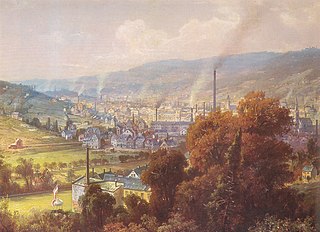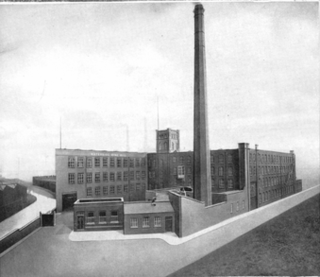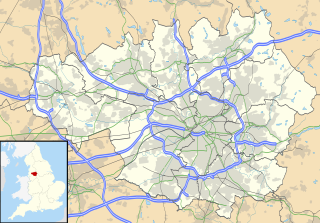Related Research Articles

Calico is a plain-woven textile made from unbleached, and often not fully processed, cotton. It may also contain unseparated husk parts. The fabric is far coarser than muslin, but less coarse and thick than canvas or denim. However, it is still very cheap owing to its unfinished and undyed appearance.

Textile manufacture during the Industrial Revolution in Britain was centred in south Lancashire and the towns on both sides of the Pennines. In Germany it was concentrated in the Wupper Valley, Ruhr Region and Upper Silesia, in Spain it was concentrated in Catalonia while in the United States it was in New England. The main key drivers of the Industrial Revolution were textile manufacturing, iron founding, steam power, oil drilling, the discovery of electricity and its many industrial applications, the telegraph and many others. Railroads, steam boats, the telegraph and other innovations massively increased worker productivity and raised standards of living by greatly reducing time spent during travel, transportation and communications.

Jamdani is a fine muslin textile produced for centuries in South Rupshi of Narayanganj district in Bangladesh on the bank of Shitalakhwa river. The historic production of jamdani was patronized by imperial warrants of the Mughal emperors. Under British colonialism, the Bengali jamdani and muslin industries rapidly declined due to colonial import policies favoring industrially manufactured textiles. In more recent years, the production of jamdani has witnessed a revival in Bangladesh. Jamdani is typically woven using a mixture of cotton and gold thread.

The textile industry is primarily concerned with the design, production and distribution of yarn, cloth and clothing. The raw material may be natural, or synthetic using products of the chemical industry.

Textile manufacturing is a major industry. It is largely based on the conversion of fibre into yarn, then yarn into fabric. These are then dyed or printed, fabricated into cloth which is then converted into useful goods such as clothing, household items, upholstery and various industrial products. Overall many things can be made with cotton not just clothing.

Barrowford is a large village and civil parish in the Pendle district of Lancashire, England. It is situated to the north of Nelson on the other side of the M65 motorway, and forms part of the Nelson conurbation. It also comprises the area of Lowerford. The parish has a population of 6,171.

Gallarate[ɡallaˈraːte] is a city and comune of Alto Milanese of Lombardy and of Milan metropolitan area, northern Italy, in the Province of Varese. It has a population of some 54,000 people.

Theater drapes and stage curtains are large pieces of cloth that are designed to mask backstage areas of a theater from spectators. They are designed for a variety of specific purposes, moving in different ways and constructed from various fabrics. Many are made from black or other darkly colored, light-absorbing material. Theater drapes represent a portion of any production's soft goods, a category comprising any non-wardrobe, cloth-based element of the stage or scenery. Theater curtains are often pocketed at the bottom to hold weighty chain or to accept pipes to remove their fullness and stretch them tight.

Anatolian rug is a term of convenience, commonly used today to denote rugs and carpets woven in Anatolia and its adjacent regions. Geographically, its area of production can be compared to the territories which were historically dominated by the Ottoman Empire. It denotes a knotted, pile-woven floor or wall covering which is produced for home use, local sale, and export. Together with the flat-woven kilim, Anatolian rugs represent an essential part of the regional culture, which is officially understood as the Culture of Turkey today, and derives from the ethnic, religious and cultural pluralism of one of the most ancient centres of human civilisation.
Fine Spinners and Doublers was a major cotton spinning business based in Manchester, England. At its peak it was a constituent of the FT 30 index of leading companies on the London Stock Exchange.

Waterside Mill, Ashton-under-Lyne was a combined cotton spinning weaving mill in Whitelands, Ashton-under-Lyne, Greater Manchester, England. It was built as two independent factories. The weaving sheds date from 1857; the four-storey spinning mill dates from 1863. The spinning was taken over by the Lancashire Cotton Corporation in the 1930s. Production finished in 1959. Waterside Mill was converted to electricity around 1911.

Bolton Union Mill was a cotton spinning mill in Halliwell, Bolton, Greater Manchester. It was built in 1875 and 1880. It was taken over by the Lancashire Cotton Corporation in the 1930s and brought back into production. Subsequently, it passed to Tootals and Dewhurst Dent in 1964. Production finished in 1967.

Welkin Mill, Lower Bredbury is a cotton spinning mill in Lower Bredbury/Portwood, Stockport, Greater Manchester. It was built in the early years of the 20th century for ring spinning. It was taken over by the Lancashire Cotton Corporation in the 1930s and passed to Courtaulds in 1964. Production ended in 1967. The 162,000 sq ft (15,100 m2), four-storey mill occupies a 5.15 acres (2.08 ha) site on Welkin Road.

Monton Mill was a cotton spinning mill in Eccles, Greater Manchester, England, built in 1906. It was taken over by the Lancashire Cotton Corporation in the 1930s and passed to Courtaulds in 1964. After production ended, it was demolished and replaced with housing; its name is preserved in the street name.

Kingston Mill, Stockport is a mid nineteenth century cotton spinning mill in Edgeley, Stockport, Greater Manchester, England. It was taken over by the Lancashire Cotton Corporation in the 1930s and passed to Courtaulds in 1964. Production finished, it was made over to multiple uses.

Harle Syke is a small village within the parish of Briercliffe, situated three miles north of Burnley, Lancashire, England. It was the home to eleven weaving firms, working out of seven mills. Queen Street Mill closed in 1982, and was converted to a textile museum, preserving it as a working mill. It is the world's last 19th-century steam powered weaving mill.
The textile industry in India traditionally, after agriculture, is the only industry that has generated huge employment for both skilled and unskilled labour. The textile industry continues to be the second-largest employment generating sector in India. It offers direct employment to over 35 million in the country. According to the Ministry of Textiles, the share of textiles in total exports during April–July 2010 was 11.04%. During 2009–2010, the Indian textile industry was pegged at US$55 billion, 64% of which services domestic demand. In 2010, there were 2,500 textile weaving factories and 4,135 textile finishing factories in all of India. According to AT Kearney’s ‘Retail Apparel Index’, India was ranked as the fourth most promising market for apparel retailers in 2009.

The Museum of Textiles and Industry is one of the two museums in Busto Arsizio, Italy, that specialises in spinning and weaving. It was opened in 1997 to house objects, pictures and archive material representing Busto Arsizio's industrial history.
Richard Haworth and Co. was established by Richard Haworth in 1854 as a cotton spinning and manufacturing firm in Cannon Street, Manchester, and Tatton Mill in Salford. Today the company is part of the Ruia Group which comprises a number of companies that import, supply and distribute textiles and hosiery to retailers and hospitality organisations. Richard Haworth Ltd. supplies a range of linens to the hospitality sector.
The textile industry in China is the largest in the world in both overall production and exports. China exported $274 billion in textiles in 2013, a volume that was nearly seven times that of Bangladesh, the second largest exporter with $40 billion in exports. This accounted for 43.1% of global clothing exports.